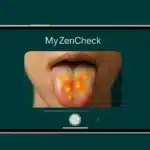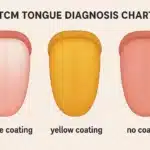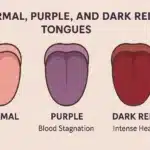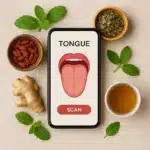Our tongues can reveal much more than what meets the eye. According to Traditional Chinese Medicine (TCM), specific tongue textures—like cracks, red dots, and a glossy surface—can signal internal imbalances that are worth paying attention to. This guide will help you understand what these signs might mean, how to approach them, and when to consult a professional.
Understanding Tongue Surface Abnormalities
Tongue Cracks: Causes and Meaning
Cracks on the tongue often indicate fluid or Yin deficiency. This condition may result from chronic stress, dehydration, or poor dietary habits.
Common Indicators:
- Dry mouth
- Night sweats
- Fatigue
- Digestive issues
Recommendations:
- Increase hydration with water, broths, and porridges.
- Avoid spicy, fried, and overly salty foods.
- Incorporate foods rich in vitamins B and C, and iron.
When to See a Professional: If cracks persist or worsen despite dietary adjustments, consult a Traditional Chinese Medicine (TCM) practitioner or healthcare provider.
Red Spots on the Tongue: Causes and Meaning
Red dots, especially when scattered across the tongue, typically point to heat in the blood or damp-heat conditions. These can result from stress, dietary imbalances, or internal inflammation.
Common Indicators:
- Sensation of internal heat
- Skin irritation or itching
- Oily skin and bad breath
- Insomnia and irritability
Recommendations:
- Consume cooling foods like cucumbers, pears, and watermelon.
- Drink herbal teas like chamomile, mint, or green tea.
- Avoid spicy, fried foods and alcohol.
When to See a Professional: Persistent red dots, especially with other heat symptoms, warrant a TCM consultation for tailored herbal and lifestyle advice. Visit National library of medicine
Glossy Tongue: Causes and Meaning
A glossy, smooth tongue usually signals Yin deficiency or fluid depletion, sometimes resulting from chronic stress, illness, or prolonged exposure to internal heat.
Common Indicators:
- Dry mouth
- Insomnia
- Heat sensations, especially in the palms and soles
- Weak digestion
Recommendations:
- Boost hydration with water, aloe vera, and herbal teas.
- Avoid heating and drying foods like coffee, alcohol, and spicy dishes.
- Include Yin-nourishing foods like sesame, tofu, and seaweed.
When to See a Professional: A glossy tongue that persists may indicate a deeper imbalance needing professional diagnosis and possibly herbal interventions.
Traditional Chinese Medicine Insights and Solutions
TCM provides a holistic approach to tongue abnormalities:
- Dietary Adjustments: Focus on cooling or warming foods based on the tongue’s condition.
- Hydration: Regular fluid intake is crucial, especially for Yin or fluid deficiencies.
- Herbal Support: TCM herbs like chamomile, mint, ginger, and goji berries can offer targeted relief.
- Lifestyle Practices: Stress management techniques like breathwork, meditation, and gentle movement support recovery.
When to Consult a Professional
While some minor tongue changes can resolve with self-care, it’s important to seek professional guidance if:
- Tongue abnormalities persist for more than two weeks.
- Symptoms like pain, severe dryness, or systemic issues accompany tongue changes.
- You experience significant discomfort or new health concerns.
A TCM practitioner can offer in-depth diagnostics and tailor a treatment plan that harmonizes your body’s internal balance.
Learn More
For detailed tongue diagnostics and AI-assisted assessments, visit our AI Tongue Analysis Scanner. You can also download our AI Tongue Diagnostic Scanner App here.
Explore more wellness insights at myzencheck.com.
- AI Tongue Diagnosis Engine – August 2025 Updates & Improvements
- White, Yellow, or No Coating? What Tongue Coating Reveals About Your Body in TCM
- AI tongue health check: What Your Tongue Says About Your Health
- Understanding Purple and Dark Tongues: What Your Tongue Says About Your Circulatory Health
- From Diagnosis to Action: Healing Foods Based on Your Tongue Type





